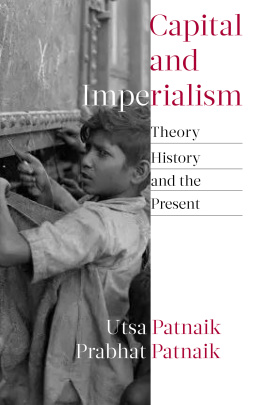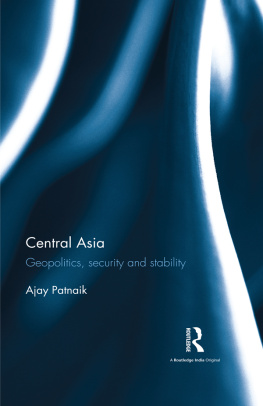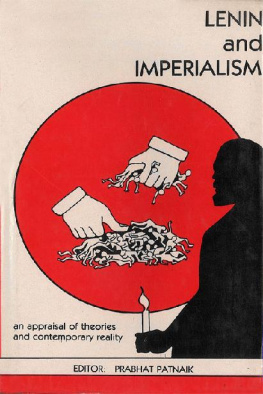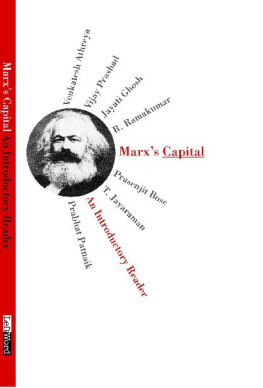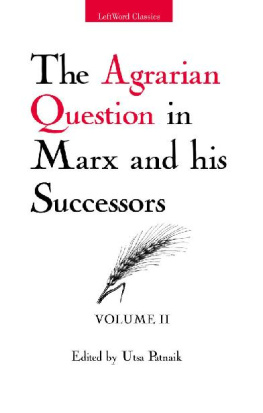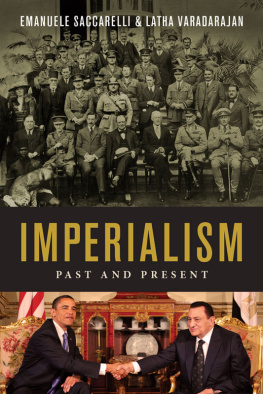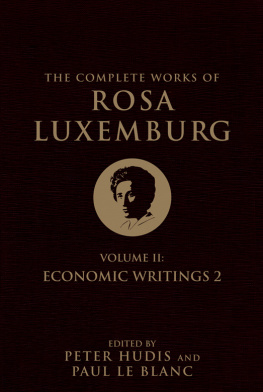Utsa Patnaik and Prabhat Patnaik - Capital and Imperialism: Theory, History, and the Present
Here you can read online Utsa Patnaik and Prabhat Patnaik - Capital and Imperialism: Theory, History, and the Present full text of the book (entire story) in english for free. Download pdf and epub, get meaning, cover and reviews about this ebook. year: 2021, publisher: NYU Press, genre: Romance novel. Description of the work, (preface) as well as reviews are available. Best literature library LitArk.com created for fans of good reading and offers a wide selection of genres:
Romance novel
Science fiction
Adventure
Detective
Science
History
Home and family
Prose
Art
Politics
Computer
Non-fiction
Religion
Business
Children
Humor
Choose a favorite category and find really read worthwhile books. Enjoy immersion in the world of imagination, feel the emotions of the characters or learn something new for yourself, make an fascinating discovery.
- Book:Capital and Imperialism: Theory, History, and the Present
- Author:
- Publisher:NYU Press
- Genre:
- Year:2021
- Rating:3 / 5
- Favourites:Add to favourites
- Your mark:
- 60
- 1
- 2
- 3
- 4
- 5
Capital and Imperialism: Theory, History, and the Present: summary, description and annotation
We offer to read an annotation, description, summary or preface (depends on what the author of the book "Capital and Imperialism: Theory, History, and the Present" wrote himself). If you haven't found the necessary information about the book — write in the comments, we will try to find it.
Capital and Imperialism: Theory, History, and the Present — read online for free the complete book (whole text) full work
Below is the text of the book, divided by pages. System saving the place of the last page read, allows you to conveniently read the book "Capital and Imperialism: Theory, History, and the Present" online for free, without having to search again every time where you left off. Put a bookmark, and you can go to the page where you finished reading at any time.
Font size:
Interval:
Bookmark:

WINNER OF THE PAUL A. BARAN PAUL M. SWEEZY MEMORIAL AWARD
Established in 2014, this award honors the contributions of the founders of the Monthly Review tradition: Paul M. Sweezy, Paul A. Baran, and Harry Magdoff. It supports the publication in English of distinguished monographs focused on the political economy of imperialism. It also applies to writings previously unpublished in English, and includes translations of new work first published in languages other than English. Please visit monthlyreview.org for complete details of the award.
PAST RECIPIENTS
Imperialism in the Twenty-first Century: Globalization, Super-Exploitation, and Capitalisms Final Crisis John Smith
The Age of Monopoly Capital: Selected Correspondence of Paul A. Baran and Paul M. Sweezy, 19491964 Edited and annotated by Nicholas Baran and John Bellamy Foster
Value Chains: The New Economic Imperialism Intan Suwandi
THEORY, HISTORY, AND THE PRESENT
Capital and Imperialism
Utsa Patnaik Prabhat Patnaik

MONTHLY REVIEW PRESS
New York
Copyright 2021 by Utsa Patnaik and Prabhat Patnaik
Published by Monthly Review Press
All Rights Reserved
Library of Congress Cataloging-in-Publication Data available from the publisher
ISBN paper: 978-158367-890-9
ISBN cloth: 978-1-58367-891-6
Typeset in Bulmer Monotype
MONTHLY REVIEW PRESS, NEW YORK
monthlyreview.org
5 4 3 2 1
Contents
For Akeel Bilgrami and C. P. Chandrasekhar
Preface
T he pervasive tendency on the part of practitioners of theoretical economics has been to analyze capitalism as a closed self-contained system. This is logically untenable, and it also gives a misleading picture of its actual history. The purpose of this book is to counter this theoretical perspective. Here we put forward the proposition that not only has capitalism always been historically ensconced within a pre-capitalist setting from which it emerged, with which it interacted, and which it modified for its own purposes, but additionally that its very existence and expansion is conditional upon such interaction.
The first five chapters of the book, which mainly deal with and provide critiques of accepted theory, argue that a closed self-contained capitalism in the metropolis is a logical impossibility. In later chapters we discuss the specific ways in which capitalism has shaped, and continues to shape, its pre-capitalist environment to suit its needs. This provides a reading of the history of capitalism that is very different from the usual reading. This history is captured from our particular theoretical perspective, and is not meant to be an attempt to provide a comprehensive account of the system in all its facets.
This book is the product of a long period of thought and work, in the course of which we have accumulated a large intellectual and personal debt to numerous friends and colleagues. It is not possible to mention all of them, but it would be invidious not to mention some.
For any student of political economy belonging to our generation, the intellectual debt to Irfan Habib and Amiya K. Bagchi is incalculable. In addition, we gratefully acknowledge the interaction and encouragement we received from Akeel Bilgrami, Sayera Habib, Sunanda Sen, Carol Rovane, Radhika Desai, Akbar Noman, C. P. Chandrasekhar, Jayati Ghosh, Indu Chandrasekhar, Praveen Jha, Nishad Patnaik, and Rajendra Prasad. None of them, however, bears any responsibility for the views expressed in this book, which, whatever their worth, are our own.
Finally, we owe a deep debt of gratitude to Michael Yates, Colin Vanderburg, and Erin Clermont for their help in bringing the manuscript to its present shape.
UTSA PATNAIK
PRABHAT PATNAIK
PART 1
CHAPTER 1
A Money-Using Economy
T he conceptual representation of capitalism that is analyzed in economic theory in almost all its major strands has not only been significantly different from the reality of the system but is also logically flawed. Such a claim on our part may appear as hyperbole at first sight, but we make it in all seriousness. And in making it, we do not wish to cast any aspersions on the luminaries of the discipline; we only wish to underscore that economics has been perennially afflicted by a blind spot caused by being developed essentially within a metropolitan location. The purpose of this book is to establish the limited, and hence flawed, nature of this perception that afflicts the subject, and to provide an alternative conceptual representation of capitalism that is both theoretically and empirically better grounded than what economic theory has offered till now.
The conceptual representation in economic theory, from its inception, has basically been of an isolated capitalist economy, where, in its simplest version, only capitalists and workers exist, with the state ensuring that law and order prevails and the rules of the game of the system are followed. When international trade has been introduced into this picture, it has been trade among such isolated capitalist economies, and therefore, though enlarging the unit of analysis, adds little of substance to the basic conclusions. Now, a major logical flaw in this representation is that such an isolated capitalist economy simply cannot be a money-using capitalist economy in any meaningful sense. A money-using capitalist economy, in other words, has requirements that no isolated capitalist economy of the sort highlighted in economic theory can possibly fulfill. Let us examine some of the implications of money-use.
Says Law and the Wealth Demand for Money
Money has long been a medium of circulation. A money-using economy, above all, is one in which a certain amount of money is always kept in the possession of economic agents for managing transactions, meeting what economists call the transaction demand for money.
The money held for transaction purposes can be visualized as follows: Economic agents sell commodities, including in the case of workers their labor-power, obtain money in exchange for the sale, and use this money for buying the commodities they need. Since there is a time-lag in the case of each agent between sale and purchase, money is held by each in the interim period. Aggregated across all economic agents at any point of time, this is the total amount of money-stock held for managing transactions in an economy.
Some money, however, may be held by each economic agent in excess of what the agent would normally hold at any point of time for transaction purposes alone. It represents a command over goods and services that is never actually transformed over any given period into goods and services. It is simply a form in which economic agents hold their wealth.
Economic theory, apart from certain heterodox traditions that we will discuss later, posits that though money is certainly held for transaction purposes, it cannot possibly be held as wealth, since it is a barren asset that earns nothing. Any individual holding wealth in the form of money is certainly not acting in his or her best interests, since if this wealth would have been held in some non-money form, it would have fetched the owner a positive rate of return, which money in itself does not.
But non-heterodox economic theory does not hold this view as a plausible reading of the world. The very foundations of non-heterodox economic theory rest upon the assumption that money is not held as a form of wealth, above and beyond what is needed for transaction purposes. Let us see why.
Next pageFont size:
Interval:
Bookmark:
Similar books «Capital and Imperialism: Theory, History, and the Present»
Look at similar books to Capital and Imperialism: Theory, History, and the Present. We have selected literature similar in name and meaning in the hope of providing readers with more options to find new, interesting, not yet read works.
Discussion, reviews of the book Capital and Imperialism: Theory, History, and the Present and just readers' own opinions. Leave your comments, write what you think about the work, its meaning or the main characters. Specify what exactly you liked and what you didn't like, and why you think so.

